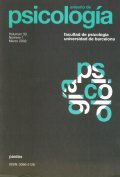Comportamiento anticonceptivo en estudiantes universitarios y riesgo de infección con el virus de immunodeficiencia humana (VIH)
Paraules clau:
AIDS prevention, contraceptive behavior, condom use.Resum
We studied the eficacy of contraceptive behavior in 225 students (22.7% men and 77.3% women) in avoiding unwanted pregnancies and AIDS and other sexually transmitted diseases (STD). We asked about contraceptivebehavior with the last partner. No time limitations were imposed. Half of the subjects were not sexually active. Half of the contraceptive practices reported by the sexually active subjects were effective in avoid AIDS, other STD and pregnancy (use of condom in all cases). A third of the
practices were effective only in avoiding pregnancy (i.e. oral contraceptives) and the rest did not protect against any of the thrree possibilities (i.e. occasional use of candoms or coitus interruptus). With age and sexual experience the use of oral contraceptive increased and the use of condoms decreased. These findings show that young people are more concerned with avoiding pregnancy than with avoiding sexually transmitted diseases. More needs to be done to publicize the efficacy of the condom as a contraceptive
method and its protective role against disease.
Descàrregues
Publicades
2002-01-11
Número
Secció
Articles
Llicència
El/la autor/a que publica en esta revista está de acuerdo con los términos siguientes:
El/la autor/a cede en exclusiva todos los derechos de propiedad intelectual al/la editor/a para todo el mundo y toda la duración de los derechos de propiedad intelectual vigentes aplicables.
El/la autor/a puede difundir una copia de sus artículos respetando la política de acceso libre de la revista.


